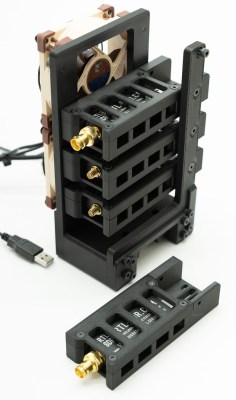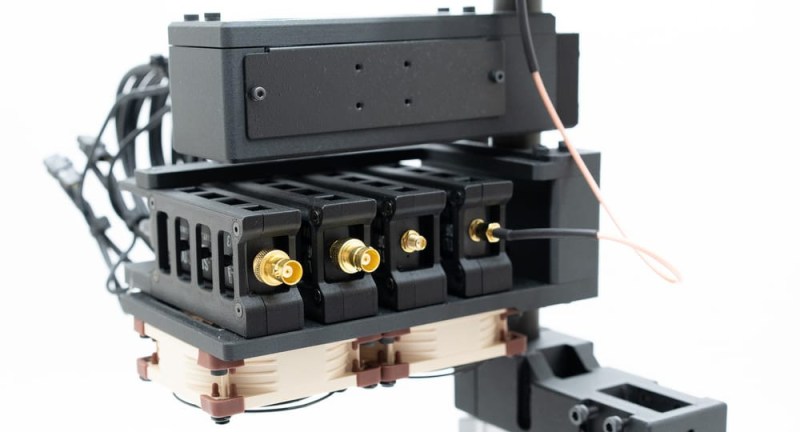With as cheap and versatile as RTL-SDR devices are, it’s a good idea to have a couple of them on hand for some rainy day hacking. In fact, depending on what signals you’re trying to sniff out of the air, you may need multiple interfaces anyway. Once you’ve amassed this arsenal of software defined radios, you may find yourself needing a way to transport and deploy them. Luckily, [Jay Doscher] has you covered.
 His latest creation, the SDR SOLO, is a modular system for mounting RTL-SDRs. Each dongle is encased in its own 3D printed frame, which not only protects it, but makes it easy to attach to the base unit. To keep the notoriously toasty radios cool, each frame has been designed to maximize airflow. You can even mount a pair of 80 mm fans to the bottom of the stack to really get the air moving. The current design is based around the RTL-SDR Blog V4, but could easily be adapted to your dongle of choice.
His latest creation, the SDR SOLO, is a modular system for mounting RTL-SDRs. Each dongle is encased in its own 3D printed frame, which not only protects it, but makes it easy to attach to the base unit. To keep the notoriously toasty radios cool, each frame has been designed to maximize airflow. You can even mount a pair of 80 mm fans to the bottom of the stack to really get the air moving. The current design is based around the RTL-SDR Blog V4, but could easily be adapted to your dongle of choice.
In addition to the row of SDR dongles, the rig also includes a powered USB hub. Each radio connects to the hub via a short USB cable, which means that you’ll only need a single USB cable running back to your computer. There’s also various mounts and adapters for attaching antennas to the system. Stick it all on the end of a tripod, and you’ve got a mobile radio monitoring system that’ll be the envy of the hackerspace.
As we’ve come to expect, [Jay] put a lot of thought and effort into the CAD side of this project. Largely made of 3D printed components, his projects often feature a rugged and professional look that really stands out.
















I was under the impression that USB2 bandwidth was a limiting factor when running a single RTL-SDR, I can’t imagine a hub running several makes that any easier?
the RTL-SDR has an absolute maximum sample rate of 3.2 MS/sec, with a sample size of 8 bits. Shouldn’t be a problem for USB 2.0 to handle multiple streams through a single port.
I have 4 attached via a single powered hub to a Raspberry Pi for ADSB, UAT, ACARS & VDL. Works fine.
I’ve never really noticed thermal issues with my RTL-SDR’s… of course, I use them in a thermally stable, 72-degree environment. Perhaps that is sufficient for passive cooling.
It’s a RAID io ?
$50/month subscription level required to get the actual CAD files so it can be modified to fit other SDR’s?
This dude was dropped on his head or something.
doscher dot com >> About >> Join a community of other subscribers who share the same interests.
It’s a bold move to create a “community” around a website with your own name..
And that kids, is an Alpha.
\s
If you’re interested in the CAD files (assuming you use Fusion 360) I’m happy to send you them- just reach out on Instagram or via email. The CAD file membership is more popular with the people who want to mod the cyberdeck designs, and they usually just subscribe for a month, download everything, then cancel again.
It’s pretty easy to leave a grumpy comment, but it’s not super easy to make designs to share with people and find a way to fund the expensive hardware that goes into the designs- and I’m not running ads, taking paid sponsorships like “look what corp sent me this expensive thing that I don’t have to return”, and I don’t sell your info.
Anyone reading this is welcome to reach out via email (you gotta get creative to find it) or Instagram and mention Hackaday and I’m happy to send the designs for this to you.
I thank you for your willingness to share the files outside the membership route. While I’m not in need of this solution, I do appreciate your offer, and the time you put into designing the solution. :)
To run more then one rule sdr dongles, do you have to change the serial numbers on the dongle so that the bandwidth covers more. I am.using sdrTrunk.
That is a really amazing look rack. I like it a lot. But just before printing it I recalled Tthe RTL-SDR includes a TCXO Temperature compensated crystal oscillator. It’s basically a heater to improve accuracy of the crystal oscillator by keeping it’s temperature stable (above ambient). So cooling it can affect accuracy or just increase the power used to keep it warm. Does anyone have the actual temperature setting of the TCXO in the RTL-SDR?
Perhaps thermal management of the rest of the RTL-SDR (other than the TCXO) is an issue? Anyone have in references?